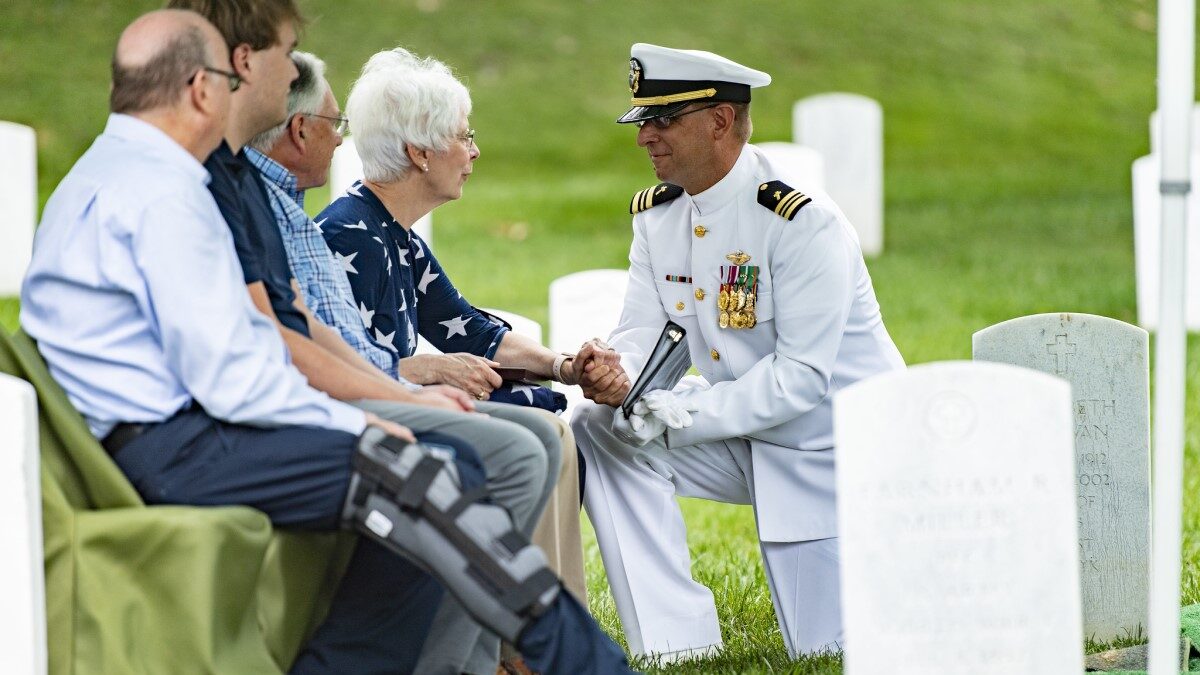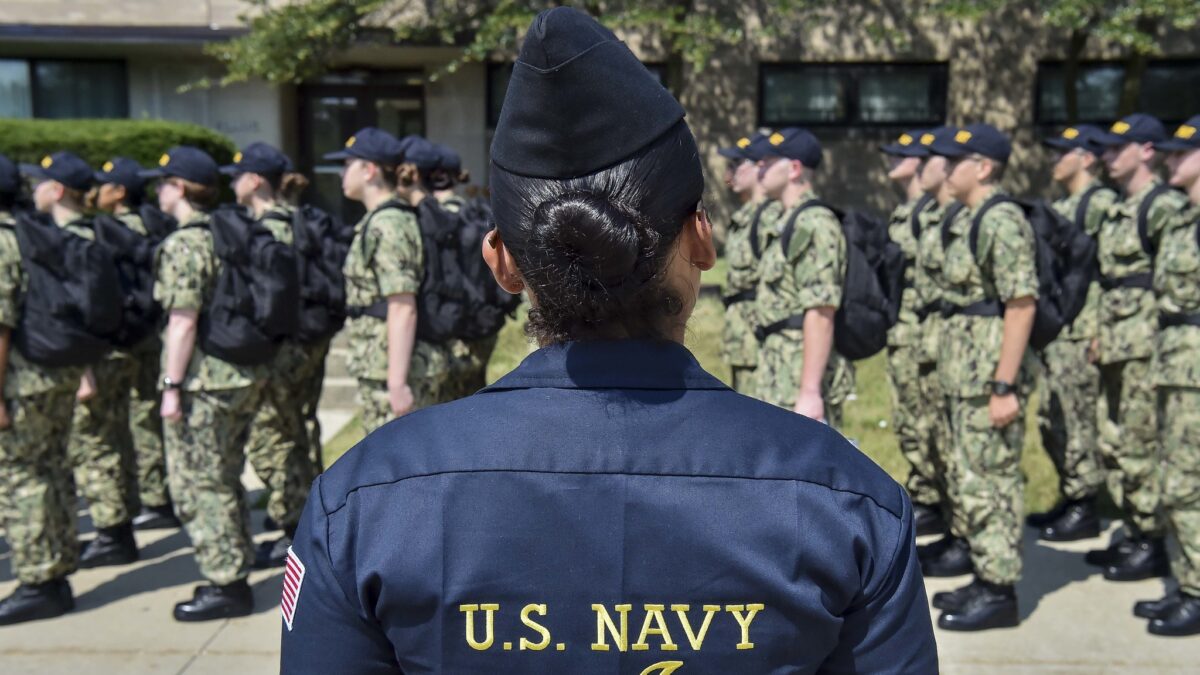
Identity politics has no place in the military; unit cohesion is formed when people put aside their differences to become part of something bigger. The U.S. Army integrated racially in 1947, long before it was legally required to, because unequal treatment undermines morale and preparedness. If battlefield medics prioritized treatment according to socially constructed demographics, the system would fall apart. There is no room for disparity; in war we are all green.
The military is a place where people of different classes, races, and religions form bonds that they never would in civilian life. This is possible because of a shared system of values: we swear to defend a common Constitution. At the very least, we all agree that freedom is worth defending.
This system of values must take precedence. All are welcome as long as one’s primary identity is “American.” Whatever sex, ethnicity, orientation, or religion you consider yourself after that is your own business. There is no denying the discriminatory policies of the past, from Blue Tickets to “Don’t Ask, Don’t Tell,” but President Trump’s opposition to an Obama-era program is not one of them.
No one can be denied the opportunity for military service based on their personal conception of self. Transgender individuals currently serve openly in the military, and their presence has in no way detracted from operational readiness.
I would strongly oppose any attempt by the president to make his Twitter “ban” proclamation into actual law. Transgender people should continue to serve openly. “Serve” is the operative word here. Military service is a voluntary undertaking; we agree to adhere to certain standards of conduct for the benefit of our comrades and the greater good of the organization. If using the bathroom corresponding to your chromosomes (while on base) and paying for your own cosmetic alterations is too great of a sacrifice, the military life may not be for you.
There Is No Transgender Ban
President Trump intends to reverse an Obama administration policy that “allowed” transgender individuals to serve openly. Of course, transgender individuals have always been—and are still—able to serve openly. The Obama policy actually sought to expand the Department of Defense’s medical coverage to include “gender transition” surgery and therapy.
A study by the RAND Corporation predicts that such a policy would cost relatively little and reduce attrition by substance abuse and suicide. It sounds like a good idea, and, more importantly, it adheres to the procedural checklist for liberal policymaking:
- Good intentions? Yes. I care so much! Look at me! I did a good thing and I want attention!
- Critical thought? No. That would be hate speech.
- Unexpected consequences? Not expecting any.
A Lack of Conscience
The first caveat to relying on the study’s figures is the assumption that substance abuse and suicide are entirely the province of the pre-operation population. Undoubtedly a great many people are happier after surgery, but to assume this physical procedure will be a panacea for all of the mental and emotional problems of every transgender person is absurd.
The study is built on the premise that providing transgender-specific medical services will reduce or eliminate the need for future mental health care. It reaches this conclusion by citing other studies showing that the lack of provision of said services (in civilians, as there have been no studies on military population) is correlated with an increased need for other treatment. In case it is not clear:
- Transgender individuals who do not undergo reassignment surgery often require mental and emotional medical services.
- Transgender individuals who do undergo reassignment surgery? No data.
- Conclusion: Reassignment surgery mitigates future medical costs.
I submit the radical counterargument that people who identify with a physical reality not intrinsically their own are likely to otherwise be quite ordinary. Some will experience severe mental and emotional distress even while possessing their genitals of choice. Comfort with one’s sex does not seem to decrease rates of post-traumatic stress disorder and suicide in veterans.
The inherent limitations of group-centric policies are readily apparent in this situation. It selectively addresses an issue shared by a diverse population of individuals, then assumes all members with that particular commonality must be exclusively defined by it. Treating all transgender people as a single group with a single objective is demeaning to the individual and antithetical to good government.
We have no studies on the long-term happiness or functionality of post-operation transgender individuals. The RAND study only employed meaningful data when estimating costs; it offered not even the pretense of caring for the well-being of service members. It fails to understand that these are real people, not statistical anomalies. It basically concludes that there are few transgender individuals in the military, and only a small percentage of those will opt to receive any transition-related care.
Congratulations, it is financially viable. There are no shortage of articles regurgitating the fact that transgender-specific care would comprise only a fraction of the current DOD expenditure on erectile dysfunction medication. The irrelevant comparison is perhaps a response to the president’s claim, but it similarly ignores the real issues, and senselessly marginalizes another group of service members.
Exhibiting a superb oblivion to their own hypocrisy, media outlets have denigrated the rights of service members to express their sexuality, while pretending to fight for that very objective. What of transgender military personnel who suffer from erectile dysfunction? Would any media outlet dare say a word about it?
Medicine Is Not Politics
Every prescription drug goes through years of exhaustive testing before it receives Food and Drug Administration approval, and such approval does not guarantee acceptance by the DOD Formulary. This is ostensibly done in the name of safety and efficacy, but civilians and service members alike have perished waiting for potentially life-saving medicine to make its way through the bureaucratic web.
I do not wish to impose unnecessary barriers to care on transgender people; my aim is only to highlight the discrepancy between the proposed management of one particular medical condition with the actual management of every other medical condition.
It is unethical for the government to grant a special exemption for reassignment surgery. The implication is that one group may use government resources for an entirely discretionary procedure while all other groups remain subject to the full scrutiny of administrative process. No claims of urgency have been made, no rationale for expedition has been given. The bizarre political ploy of rushing this unproven elective procedure into use, bypassing an otherwise standardized process, sets a dangerous precedent. It eschews the scientific method, foundation of all modern medicine, to be accredited via alignment with the public imagination. Finally, the tyrannical mob has regained its status as arbiter of truth; witch hunts and pogroms to follow.
Only by using such mass hysteria (uh oh, sexism alert!) can an entire system be overhauled by a single uncontested study. It is the opposite of enlightenment; it is the unquestioned acceptance of a single perspective based on a centrally dictated narrative. It is in spiritual alignment with the North Korean system, where the great leader, having invented both the gelatin capsule and the pancreas, is beyond reproach on medical matters.
Even if the proposed course of transgender “care” were scientifically established and economically sound, the DOD would not be required to adopt it. There are plenty of widely accepted, effective, and safe procedures—such as abortion—currently unavailable on military installations. There is no argument as to whether a DOD employee may privately conduct his/her/xer affairs. The only argument is whether said affairs require government expenditure.









